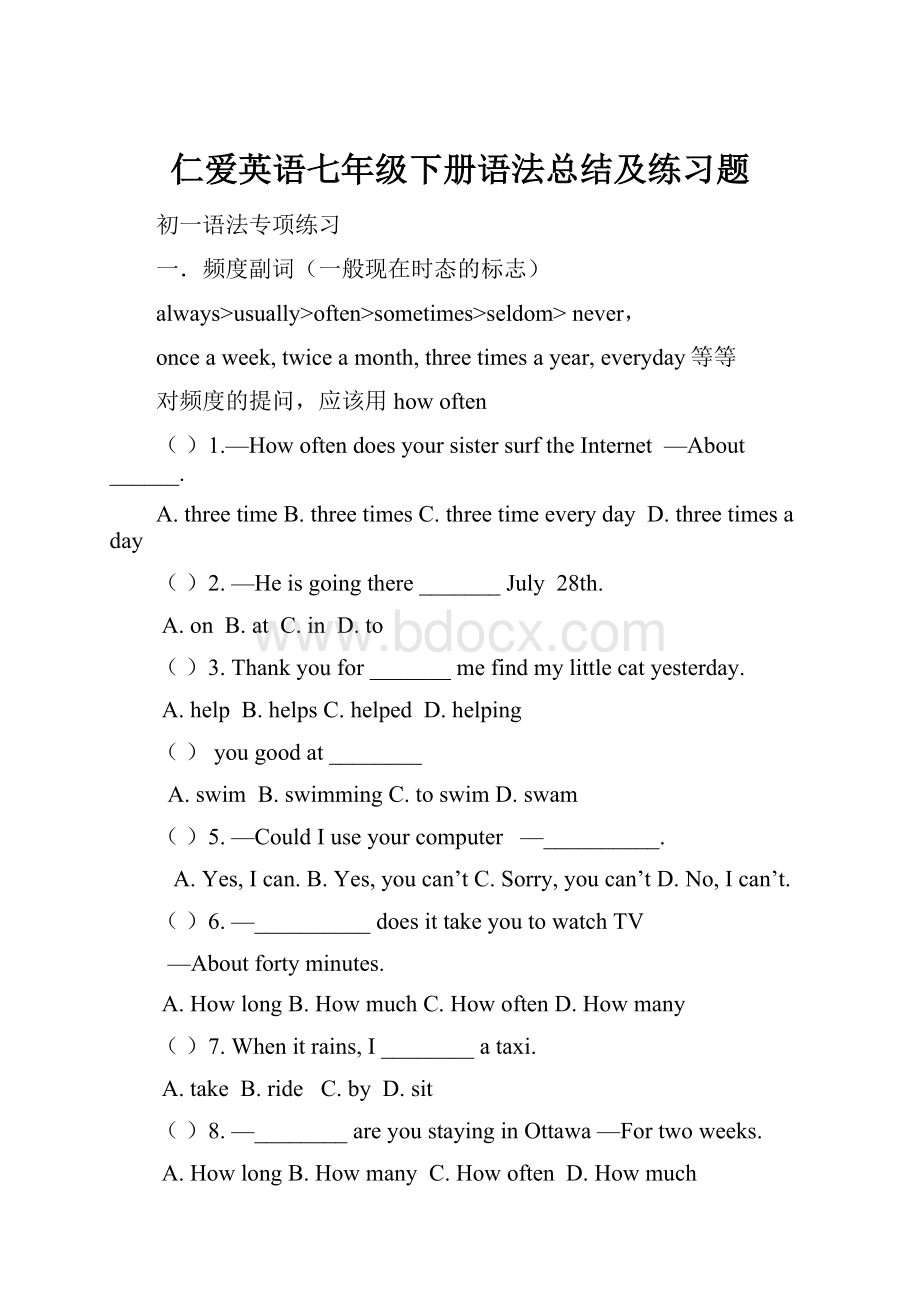仁爱英语七年级下册语法总结及练习题.docx
《仁爱英语七年级下册语法总结及练习题.docx》由会员分享,可在线阅读,更多相关《仁爱英语七年级下册语法总结及练习题.docx(13页珍藏版)》请在冰豆网上搜索。

仁爱英语七年级下册语法总结及练习题
初一语法专项练习
一.频度副词(一般现在时态的标志)
always>usually>often>sometimes>seldom>never,
onceaweek,twiceamonth,threetimesayear,everyday等等
对频度的提问,应该用howoften
()1.—HowoftendoesyoursistersurftheInternet—About______.
A.threetimeB.threetimesC.threetimeeverydayD.threetimesaday
()2.—Heisgoingthere_______July28th.
A.onB.atC.inD.to
()3.Thankyoufor_______mefindmylittlecatyesterday.
A.helpB.helpsC.helpedD.helping
()yougoodat________
A.swimB.swimmingC.toswimD.swam
()5.—CouldIuseyourcomputer—__________.
A.Yes,Ican.B.Yes,youcan’tC.Sorry,youcan’tD.No,Ican’t.
()6.—__________doesittakeyoutowatchTV
—Aboutfortyminutes.
A.HowlongB.HowmuchC.HowoftenD.Howmany
()7.Whenitrains,I________ataxi.
A.takeB.rideC.byD.sit
()8.—________areyoustayinginOttawa—Fortwoweeks.
A.HowlongB.HowmanyC.HowoftenD.Howmuch
()9.DoesBabaragotowork__________busor___________foot
A.to;byB.with;onC.by;onD.on;on
()10.Mybirthdayisin________.
A.TuesdayB.AprilC.March3rdD.Monday
二.交通方式的表达:
by+交通工具或动词短语构成bybike,bybus,bycar,byplane,bytrain,bysubway,byland,byair,bysea,bywater,onfoot,
(rideabike,takeabus,takeaplane,takeatrain,takethesubway,walkto)
问交通方式则应该用how,如:
HowdoeshegotoschoolHowdoyougototheparkHowdoesshegotowork
1.Mymothergoestoworkbybus.(同义句)
Mymothergoestowork_____________.
2.Mygrandmaoftengoeshomebysubway.(就划线部分提问)
_______doesyourgrandmaoften________home
Yangwalkstoworkeveryday.(改为同义句)
MissYanggoestowork________everyday
grandmausuallytakesthesubwayhome.(就划线部分提问)
yourgrandmagohome
三、现在进行时:
1.定义:
表示(说话瞬间)正在进行或发生的动作。
经常与now,atthemoment,look,listen等词连用。
2.基本结构:
be(am/is/are)+v-ing(动词的现在分词)I’mwatchingTVnow.
3.现在分词的构成:
(1)一般情况下在动词词尾加ing。
go→going ask→asking look→looking
(2)以不发音的e结尾的动词,去掉e加ing。
have→having take→taking make→making write→writing
(3)以一个辅音字母结尾的重读闭音节,双写最后一个字母,再加-ing。
get→getting swim→swimming begin→beginning shop→shopping
4.现在进行时态的肯定式、否定式、疑问式及简略回答。
(1)肯定式:
be+v-ing Sheissinginginthenextroom.
(2)否定式:
be+not+v-ing Thestudentsaren’tcleaningtheroom.
(3)一般问句:
be动词提前。
肯定答语Yes,主语+be,否定答语No,主语+benot。
5.特殊疑问问句:
疑问词+be+主语+doing+其他(疑问词+一般疑问句)
Ⅰ.写出下列动词的ing形式
1.clean_______2.read_________3.play________4.have_______5.get________
6.eat_________7.take________8.make_______9.look_________
Ⅱ.句型转换
1.Amyisplayingcomputergames.(一般疑问句,肯定回答)
________________________________________________________________
aredoingtheirhomework.(一般疑问句否定句)
_________________________________________________
_________________________________________________
3.Thestudentsarecleaningtheclassroom.(一般疑问句,否定回答)
_________________________________________________________
4.I’mplayingfootballontheplayground.(画线提问)
___________________________________________________
5.Tomisreadingbooksinhisstudy.(画线提问)
___________________________________________________
四.现在进行时与一般现在时的区别:
(一)一般现在时
定义:
表示经常性的动作。
经常与频率副词(时间状语)连用:
often经常,usually通常,always总是,every每个,sometimes有时,at…在几点钟等。
只有第三人称单数用动词三单形式,其余动词均用原形。
(二)现在进行时
1.定义:
表示(说话瞬间)正在进行或发生的动作,。
经常与now,atthemoment,look,listen等词连用。
1.现在进行时表示动作的暂时性,而一般现在时表示动作的习惯性和经常性
IamwatchingTVnow.(暂时性)
IwatchTVeveryday.(经常性)
2.现在进行时可表示短暂性动作,而一般现在时表示长久性动作。
LucyislivinginBeijing.(短时间居住)
LucylivesinBeijing.(长久性居住)
Ⅰ.用动词的适当形式填空。
1.Weoften______(play)intheplayground.
2.He_____(get)upatsixo’clock.
3.----Who_______(sing)asong----LiYingis.
5.Danny_____(study)English,Chinese,math,scienceandartatschool.
6.Mikesometimes________(go)totheparkwithhissister.
7.________Mike________(read)Englisheveryday
8.Look,theboy__________(run)fast.
9.----Whatareyoudoing----I_________(do)myhomework.
10.Look!
Theboyoverthere_______(play)amodelplane.
五、therebe句型
1、定义:
Therebe句型表示某处存在某物或某人。
2、结构:
(1)Thereis+单数可数名词/不可数名词+地点状语.
(2)Thereare+复数名词+地点状语.
注意事项:
there是引导词,在句中不充当任何成分,翻译时也不必译出。
句子的主语是某人或某物,谓语动词be要与主语(某人或某物)的数保持一致。
当主语是两个或两个以上的名词时,谓语动词要与跟它最近的那个名词一致。
如:
Thereisateacherandmanystudentsinourclassroom.
我们教室里有一位老师和许多学生。
Therearemanystudentsandateacherinourclassroom.
树下有两个男孩,一个女孩。
therebe句型的常考点
考点一:
各种句型转化。
1:
变成否定
Therebe句型的否定式的构成和含有be动词的其它句型一样,在be后加上not或no即可。
注意not和no的不同:
not是副词,no为形容词,nota/an/any+n.相当于no+n.。
例如:
Thereisabikebehindthetree.→Thereisn'tabikebehindthetree.=Thereisnobikebehindthetree.
2:
变成一般疑问句
Therebe句型的一般疑问句变化是把be动词调整到句首,再在句尾加上问号即可。
但同时要注意:
当肯定句中有some时,要将其改为any(否定变化也一样)。
ThereissomewateronMars.→IsthereanywateronMarsYes,thereis.No,thereisn’t.
Therearesomefishinthewater.→Arethereanyfishinthewater
Yes,thereare.No,therearen’t.
3:
特殊疑问句
对主语提问:
当主语是人的时候,则用who引导,当主语是物的时候,则用what引导。
注意:
无论原句的主语是单数还是复数,对之提问时一般都用be的单数形式(回答时却要根据实际情况来决定)。
如:
Therearemanythingsoverthere.→What'soverthere
Thereisalittlegirlintheroom.→Whoisintheroom
对地点状语提问:
则用where引导。
如:
Thereisacomputeronthedesk.→Whereisthecomputer
Therearefourchildrenontheplayground.→Wherearethefourchildren
对数量提问:
般有两种句型结构:
Howmany+复数名词+arethere+介词短语
Howmuch+不可数名词+isthere+介词短语
练习
I.将下列句子变成否定句和一般疑问句。
issomewaterinthebottle.__________________________________________________
aremanyapplesinthebox._________________________________________________
II.对句子划线部分提问。
aresevendaysinaweek._____________________________________
arelotsofbooksinour
isaknifeoverthere.__________________________________________
isalittlemilkintheglass._____________________________________。
( )not____milkinthecuponthetable.
A.are,many B.are,much C.is,many D.is,much
( )many___arethereintheroom
A.apple B.students C.milk D.paper
( )10.There____somethingwrongwithourclassroom.
A.are B.has C.is D.have
六、介词
Ⅰ、①at+具体时刻:
at3:
00
②on+具体某天
③in+年、月、季节及一天中的某部分
eg.themorningMondaymorning3.___arainyevening
4.___3:
50 2002themorningofApril10
springnight thistime10.___March
另外注意:
在时间词(morning,afternoon,evening;Sunday…)前有last,next,this,that时,不再用介词.tomorrow,tonight前也不用介词。
Ⅱ、in,on,at表地点:
at一般指小地方;in一般指大地方或某个范围之内;on往往表示“在某个物体的表面”。
eg.1)Hearrived___Shanghaiyesterday.
2)Theyarrived___asmallvillagebeforedark.
3)Thereisabighole____thewall.
4)Theteacherputupapicture____thewall.
Ⅲ、inthetree(外加在树上的事物) onthetree(树上自身具有的花、果、叶等)
inthewall(镶嵌在墙内部的事物) onthewall(墙表面的事物)
1)Thereisamap___thewall
2)Therearefourwindows___thewall.
V、infrontof:
在…前面/方(范围外) inthefrontof:
在……前部(范围内)
类似区别:
atthebackof与behind
七﹑一般过去时态
1.一般过去时表示过去某个时间发生的动作或存在的状态,常和表示过去的时间状语连用。
一般过去时也表示过去经常或反复发生的动作。
2.Be动词在一般过去时中的变化:
⑴am和is在一般过去时中变为was。
(wasnot=wasn't)
⑵are在一般过去时中变为were。
(werenot=weren't)
⑶带有was或were的句子,其否定、疑问的变化和is,am,are一样,即否定句在was或were后加not,一般疑问句把was或were调到句首。
3.句中没有be动词的一般过去时的句子
否定句:
didn't+动词原形,如:
Jimwenthomeyesterday.
Jimdidn'tgohomeyesterday.
一般疑问句:
在句首加did,句子中的动词过去式变回原形。
如:
Jimwenthomeyesterday.DidJimgohomeyesterday
特殊疑问句:
⑴疑问词+一般疑问句
如:
Jimwenthomeyesterday.
DidJimgohomeyesterdayWhatdidJimdoyesterday
与表示过去的一些时间状语连用。
1.yesterday或以其构成的短语:
yesterdaymorning(afternoon,evening)等;
2.由“last+一时间名词”构成的短语:
lastnight,lastyear(winter,month,week)等;
3.由“时间段+ago”构成的短语:
amomentago,ashorttimeago,anhourago等;
4.其它:
justnow等
5.由某些表示过去时态的从句等。
动词过去式变化规则:
1.一般在动词末尾加-ed,如:
pull-pulled,cook-cooked
2.结尾是e加d,如:
taste-tasted
3.末尾是辅音字母加一个元音字母和一个辅音字母的重读闭音节,应双写末尾的辅音字母,再加-ed,如:
stop-stopped
4.以“辅音字母+y”结尾的,变y为i,再加-ed,如:
study-studied
5.不规则动词过去式:
过去时练习
写出下列动词的过去式
cook________enjoy________dance________help_________
live__________begin________hurt_________draw_________
write_________read_________come_________go__________
do_______is_________are___________come_________
play_________sing_________ask____________dance_________
have_________write__________can___________swim_________
ride___________take__________speak________make___________
一、用be动词的适当形式填空
1.I_______atschooljustnow.
2.He________atthecamplastweek.
3.We________studentstwoyearsago.
4.They________onthefarmamomentago.
5.YangLing________elevenyearsoldlastyear.
6.There________anappleontheplateyesterday.
7.There________somemilkinthefridgeonSunday.
8.Themobilephone_______onthesofayesterdayevening.
二、句型转换
1.Itwasexciting.
否定句:
________________________________________________
一般疑问句:
____________________________________________
肯、否定回答:
__________________________________________
2.Allthestudentswereveryexcited.
否定句:
________________________________________________
一般疑问句:
____________________________________________
肯、否定回答:
__________________________________________
3.SuHaitooksomephotosattheSportsday.
否定句:
________________________________________________
一般疑问句:
____________________________________________
肯、否定回答:
__________________________________________
4.Nancywenttoschoolearly.
否定句:
________________________________________________
一般疑问句:
____________________________________________
肯、否定回答:
__________________________________________
5.WesangsomeEnglishsongs.
否定句:
________________________________________________
一般疑问句:
____________________________________________
肯、否定回答:
__________________________________________
综合时态练习:
用正确的动词形式填空。
childrenar